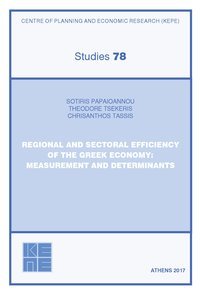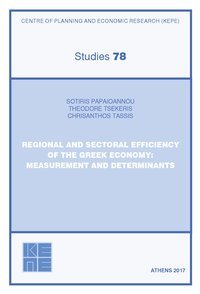- Έκδοση
- Παπαϊωάννου, Σωτήρης | Τσέκερης, Θεόδωρος | Τάσης, Χρύσανθος
- Θεοχαράκης, Νίκος
- 1η έκδοση
-
Αθήνα:
Κέντρο Προγραμματισμού και Οικονομικών Ερευνών, 2017
- 152 σελίδες : διαγράμματα, πίνακες, χάρτες
- Μελέτες ; 78. ISSN: 11085789
- 9789603411208
- Βιβλιογραφία: σελίδες 143-152
- Ελλάδα
- Πατήστε εδώ
-
- Chapter 1. Introduction -- Chapter 2. Theoretical background -- Chapter 3. Econometric specification and construction of variables -- Chapter 4. Description of data -- Chapter 5. Econometric results -- Chapter 6. Conclusions -- Appendix -- References
-
-
Η μελέτη αυτή έχει ως στόχο τη μέτρηση και την εκτίμηση των προσδιοριστικών παραγόντων της τεχνικής αποτελεσματικότητας των περιφερειών και των κλάδων της ελληνικής οικονομίας κατά την περίοδο 2000-2012. Το οικονομετρικό πλαίσιο που χρησιμοποιείται βασίζεται στην ταυτόχρονη εκτίμηση μιας συνάρτησης παραγωγής και μιας εξίσωσης τεχνικής αναποτελεσματικότητας. Τα ευρήματα της μελέτης αποκαλύπτουν την ύπαρξη σημαντικών ανισοτήτων στα επίπεδα της τεχνικής αποτελεσματικότητας μεταξύ των περιφερειών καθώς και μεταξύ των κλάδων. Οι πιο αποτελεσματικές περιφέρειες είναι αυτές της Αττικής, του Νοτίου Αιγαίου και της Δυτικής Ελλάδας. Αντίθετα, η Στερεά Ελλάδα και η Πελοπόννησος είναι οι λιγότερο αποτελεσματικές περιφέρειες. Με εξαίρεση την Αττική, όλες οι άλλες περιοχές σημείωσαν πτώση της αποτελεσματικότητάς τους από το 2008 και μετά, υποδηλώνοντας τις επιπτώσεις της οικονομικής κρίσης στην παραγωγικότητα των περιφερειών, αλλά και στη διεύρυνση του χάσματος παραγωγικότητας μεταξύ της Αττικής και των υπόλοιπων περιφερειών. Ομοίως, οι περισσότεροι κλάδοι της ελληνικής οικονομίας υπέστησαν πτώση της αποτελεσματικότητάς τους μετά το 2008. Οι πιο αποτελεσματικοί τομείς δραστηριότητας είναι αυτοί της ακίνητης περιουσίας, της δημόσιας διοίκησης και της χρηματοπιστωτικής διαμεσολάβησης, με μέσα επίπεδα αποδοτικότητας κοντά ή άνω του 80%. Οι λιγότερο αποδοτικοί τομείς είναι εκείνοι της γεωργίας, της δασοκομίας και της αλιείας, και των επαγγελματικών δραστηριοτήτων, με μέσα επίπεδα αποτελεσματικότητας μικρότερα από 50%. Τα ευρήματα της μελέτης υπογραμμίζουν ότι οι οικονομίες αστικοποίησης και η διασπορά τους στις περιφέρειες, καθώς και η ευκολία διαπεριφερειακής πρόσβασης στην αγορά, συμβάλλουν σημαντικά θετικά στην τεχνική αποτελεσματικότητα, υποδηλώνοντας τον ενισχυτικό ρόλο των ενδοπεριφερειακών και διαπεριφερειακών βελτιώσεων στις μεταφορές στην παραγωγικότητα της ελληνικής οικονομίας. Επιπλέον, θετική είναι η επίδραση της περιφερειακής εξειδίκευσης και της τομεακής συγκέντρωσης στην τεχνική αποτελεσματικότητα των ελληνικών περιφερειών, υποδεικνύοντας τη σημασία της ανάπτυξης τοπικών συμπλεγμάτων δραστηριοτήτων (όπως βιομηχανικών περιοχών, επιστημονικών και τεχνολογικών πάρκων, και επιχειρηματικών πάρκων εφοδιαστικής) για την αύξηση της παραγωγικότητας. Το ανθρώπινο κεφάλαιο (οριζόμενο ως το ποσοστό των ωρών εργασίας των ατόμων με υψηλή μόρφωση) έχει σημαντικά θετικό αντίκτυπο στη μείωση των αναποτελεσματικοτήτων των ελληνικών περιφερειών, τονίζοντας έτσι την ανάγκη επενδύσεων στην εκπαίδευση.
-
The quest for the determinants of productivity was born together with political economy. Adam Smith noted in 1776 that one of the major determinants of the wealth of nations was the “skill, dexterity, and judgment with which its labour is generally applied”. In the theories of economic growth, both exogenous and endogenous, from the 1950s onwards, econometric specifications have been devised in order to assess the impact of physical and human capital and labour on the rate of growth, leaving as a residual the “total factor productivity” that captured the role of technical (and not only) efficiency. KEPE, in its institutional role as the economic research arm of the Greek State, is interested in examining those factors that affect the productivity and the efficiency of the Greek economy. The study at hand, by Drs Papaioannou, Tsekeris, and Tassis, is an instance of KEPE’s concern with productivity. It takes properly into account the importance of the spatial dimension in measuring and quantifying the main determinants of the technical efficiency of all regions of a national economy. The case of Greece in the time period spanning 2000-2012 is of particular interest, amongst others, due to the advent of the persistent economic crisis (in 2008) and the geographical peculiarities of the country, which have resulted in significant disparities between the core region of Attica, where the capital city of Athens is located, and which produces almost half of the country’s GDP, and the periphery. The authors make a valuable original contribution to the empirical literature of regional efficiency analysis in Greece. Based on the theoretical underpinnings of economic growth and new economic geography, they adopt an interesting econometric methodology to specify and consistently estimate a production function with a two-stage stochastic frontier analysis (SFA). In this way, they simultaneously estimate technical efficiency scores and determine key factors which significantly affect efficiency levels across Greek regions and sectors. The results can provide useful insights in understanding and interpreting diverse sources of 10 inefficiency in the Greek economy. Hence, suitable policy measures can be designed which are regionally and sectorally targeted and growth-oriented to expedite the economic recovery of the country. The findings of the study related to the significance of connectivity/ accessibility within and between regions, urbanization economies and their dispersion, productive specialization, geographical concentration and human capital involve obvious policy implications for the effective deployment of the national strategic growth plan of Greece. These implications directly concern the regional and sectoral specification of the growth strategy, including policy measures that can address sectoral inefficiencies and combat regional inequalities and the increasing productivity gap between Attica and the other regions, which strongly experienced the adverse impact of the economic crisis on their efficiency. Such measures may encompass the reinforcement of local comparative advantages, intraregional and interregional transport improvements and strategic planning actions to strengthen local activity clusters and labour skills. Finally, given the increasing attention given by international organizations such as the European Council to systematically monitor and report national productivity developments, the present study can constitute a valuable input to the measurement and analysis of productivity in Greece. This analysis would support the identification and the assessment of the potential effect of relevant policy options at the sectoral, regional and national level.
-


